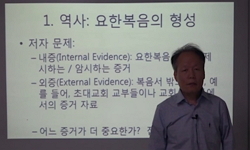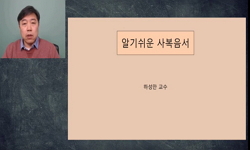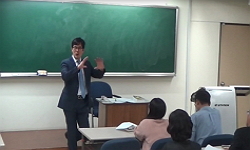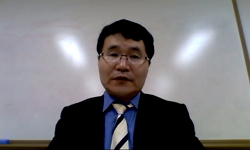This report will deal with preaching as counseling of the life-situational problems, which is focused upon Fosdick``s sermons with major emphasis on his theology of preaching, homiletical theory, and, in particular, approach to bringing the Gospel to ...
http://chineseinput.net/에서 pinyin(병음)방식으로 중국어를 변환할 수 있습니다.
변환된 중국어를 복사하여 사용하시면 됩니다.
- 中文 을 입력하시려면 zhongwen을 입력하시고 space를누르시면됩니다.
- 北京 을 입력하시려면 beijing을 입력하시고 space를 누르시면 됩니다.

연구논문 : 삶의 문제에 관한 상담으로서의 설교 -Harry Emerson Fosdick의 상담설교를 중심으로- = Preaching as Counseling of the Life-Situational Problems: Harry Emerson Fosdick`s Counseling Preaching
한글로보기https://www.riss.kr/link?id=A101803849
- 저자
- 발행기관
- 학술지명
- 권호사항
-
발행연도
2007
-
작성언어
Korean
- 주제어
-
등재정보
KCI등재
-
자료형태
학술저널
-
수록면
168-181(14쪽)
- 제공처
-
0
상세조회 -
0
다운로드
부가정보
다국어 초록 (Multilingual Abstract)
This report will deal with preaching as counseling of the life-situational problems, which is focused upon Fosdick``s sermons with major emphasis on his theology of preaching, homiletical theory, and, in particular, approach to bringing the Gospel to bear on the issues of his day. We have an almost complete record of his sermons after 1930. From statements made by Fosdick in his writings about preaching and from actual reading of his sermons, we are able to construct his theology of preaching, homiletical theory, and apply of the Gospel to persons. We will concern with some of the major problems of Fosdick``s days and show through a few representative examples that he did preach to the problems that were then affecting the people since he preached to many of the same types of problems throughout his ministry. Fosdick``s two major concerns during his ministry were the crisis of modern man``s attitudes and questions about the Christian faith in the light of the new scientific thought and the "revolution in morals." He saw that as more people came under the influence of the scientific method of thought the more they would have honest questions about the validity of a religion which used thought forms which were no longer familiar to most of them. According to Fosdick, we need more sermons that try to face people``s real problems with them, meet their difficulties, answer their questions, confirm their noblest faiths and interpret their experiences in sympathetic, wise and understanding cooperation. All aspects of life which affected the individual were potential sermon material. And since he realized that people are influenced by the moods, events, and social and ethical forces of the time in which they live these often became the focal points of his sermons. Fosdick is not only a master communicator, but also has founded his preaching upon the bedrock of a theology of preaching-not a theology of Word of God, nor what should be taught and preached, but a theology of the act of preaching itself. He has been deeply concerned with what happens when he preaches. Thus, his whole manner of preparation, planning, and presentation has made that broad influence for which the church screams today. Fosdick``s theology of preaching revolves around two foci. First is his central concern for people. The primary focus of Fosdick``s preaching was the burning concerns of human beings. His theology of preaching is inseparable from his concern for people. The second crucial point in Fosdick``s theology of preaching is that he conceived preaching as the ability to communicate to the listener the power of God to transform a life. To be sure, personal counseling has for its goal the transformation of lives. All the routine, boring, and wearisome aspects of it are more than balanced by the thrill of witnessing the victories gained by the power of the gospel. By application of the principles of personal counseling to preaching, the counseling sermon becomes no less a technique for the transformation of persons. The preacher should go into his pulpit expecting that lives will be made over. Preaching was an encounter with a man with a problem which brought to that man victory and triumph. Fosdick``s theological definition of preaching has been summarized as "a head-on constructive meeting of some problem with light to throw on it and help to bring a victory over it, a creative process which can transform lives." Constructively speaking, Fosdick``s theology is not divorced from the world; it is not isolated idealism. Rather, it deals with the hard brute fact of problems of mankind. The strength of Fosdick``s approach lies in his awareness and emphasis on problems. Thus, at the core of a composite theology of preaching must be an awareness and a passion to meet unflinchingly the problems confronting mankind today. In response to those of his own day who used the first half of a sermon for historical explanation, exposition, and topical lecture of contemporary life as reflected in the news media, Fosdick presented another alternative: religion faith based on eternal meanings but put into contemporary thought forms. He summarized certain aims of preaching as to think the great faith of the Gospel through in contemporary terms, and to harness the great dynamics of the Gospel to contemporary tasks. He saw as his basic theological concern the apologetic task, the endeavor to present a reasonable, credible, defensible interpretation of the Christian gospel. Thus, he steadfastly tries to translate the themes of the Bible into the idiom of contemporary culture, believing that the Bible cannot speak for itself. He believes that any such translation does not dilute the gospel``s power to speak to congregations. Preachers live in congregations and, as unwritten symbols of the Holy, are frequently shown the hidden interior of congregational faces. People``s lives get built into a minister``s soul. Strangely enough, however, it is difficult to describe how pastoral intimacy orders our preaching. Obviously, ministers do not think of each and every parishioner during the preparation of sermons; we do not speak to individuals with individual problems from the pulpit in spite of Fosdick``s urging. He regarded preaching as a correlate of pastoral counseling. Fosdick left his indelible stamp on a generation of preachers who came under his tutelage or were inspired by his example. His influence can still be seen today, even in preachers for whom he is nothing more than a name. He had preached to the down-to-earth problems of the people in his congregation and in the radio audience.
동일학술지(권/호) 다른 논문
-
A Study of Jesus as Teacher: Insights for Campus Ministry
- 한국대학선교학회
- 김혜란
- 2007
- KCI등재
-
- 한국대학선교학회
- 이종원
- 2007
- KCI등재
-
- 한국대학선교학회
- 천사무엘
- 2007
- KCI등재
-
- 한국대학선교학회
- 김흥수
- 2007
- KCI등재




 KISS
KISS






